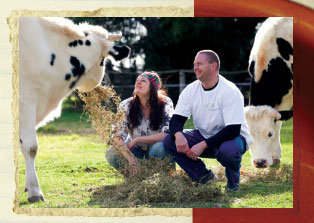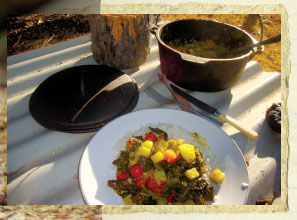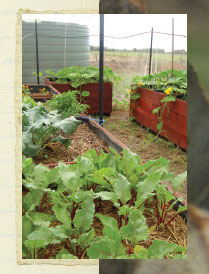
Wouldn’t it be lovely to fall off the grid? Without becoming complete hermits, we can take baby steps and move away from consumerism and materialism and become a little more self-sustaining.
This journey started with the random thought, “Could we (meaning people in general) survive 30 days without electricity? Could we survive without visiting a supermarket for 30 days?” The idea that our very lives are reliant on a fragile economic balloon that could burst any day is not exactly comforting. With this thought in mind, I started to look around. It’s amazing what you can see when you open your eyes. Figuring we could use the sun or fire to cook, my first venture was looking at the weeds we pulled up and purchasing a book on eatable weeds in this State (I found this online)
Very soon I was making dandelion marmalade, blanching a very common weed around here that farmers spray to kill and mixing in with potato salad and soups etc. This particular weed I have discovered, mallow, is high in vitamin C and other nutrients. Stinging nettle was another treasure under my nose. Apparently one of the highest sources of iron, this can be dried and drunk as tea or blanched and eaten as is, blended into a drink or mixed into sauce. My father told me how, growing up in outback Australia, greens on the dinner plate were rare, and he remembered his mother pulling up stinging nettle to feed the family. There are many other weeds that can be added to or simply eaten as salad greens.

I do recommend you thoroughly investigate what weeds you can eat in your region and ensure they have not been sprayed with poisons before consuming them.
With a beautiful big oak tree in our yard, it wasn’t long before I started collecting all the acorns each autumn to make flour. This is an extremely drawn-out process, and you wouldn’t want to be in a hurry for a small amount of flour. Mind you, the scent has a hint of coffee or chocolate, and the taste has a subtle raison bread flavour; it is worth the energy expended. The acorns need to be dried and then shelled before going through a boiling or soaking process to remove the tannins, which are toxic to humans. Varieties of oak differ in the amount of tannin in their acorns. The brown murky water that is a result of this process I bottle and use to wash our dark clothing with. It strips dirt and leaves a nice fresh smell to the clothes.
We have learnt to use these extremely long and hot summers to our advantage. Installing solar panels soon after purchasing the property was one of the best decisions we ever made. By selling our power back to the grid, the B&B rarely experiences a power bill. One very handy tip to anyone thinking of installing or have already installed solar panels is that it is imperative you wash your panels every few months. The buildup of dust can stop the sun’s rays from getting through. With at least one week per summer, where the temperature never drops below 40°C (104°F), it is a good time to cook outdoors and avoid heating up your kitchen or using any power. During our first summer here I dragged an old and broken Webber BBQ out of our barn. It was never ours, and I have no idea where it came from, but it served as a great solar oven for us. Giving it a quick dust down, I then purchased a few thermal blankets made from metalised polyester that looked like foil for a few dollars at a junk shop. I lined the Webber with this and covered it with plastic film, and it reached 100°C in less than an hour. Chopping up some vegetables from the garden, depending on what flavour of meal we were after, I might throw in some curry and coconut milk or some chopped up tomatoes and olives. Slowly cooked under the sun, dinner was always tasty and hot.

Like a lot of country properties, ours came with assorted bits of metal that ‘might come in handy one day’. For me it has always looked like rubbish, but it gets squirreled away in Scott’s man-cave for that ‘one day’. Well I have to admit, there was a big metal frame that has definitely been useful. Covered in wire and dragged out under the relentless sun’s rays, this has been the perfect dehydrator. No power usage and no white noise. With a sheet of corrugated iron laid on top, then a few old fly screens on that, we have sun-dried tomatoes and copious amounts of shredded vegetables for storage.
The heat is trapped under the iron, and with the sun boring down from above, whatever we have placed between the fly screens has the moisture drawn out of it very quickly. We would ask the local general store for newspaper they are going to throw away, and this newspaper can be torn into shreds, soaked for a day in water, and then pressed into a briquette style mould and dried out completely by sitting on the iron sheeting. These briquettes will burn for a considerable amount of time in winter. Again it’s about always thinking ahead.
We also dehydrate lemon and orange peel to make our own cleaning agent. Once the peel is complete dry it is stuffed into an old jar, and boiling vinegar is poured over it until covered. The jar is sealed, and it is left to sit for a week. The liquid is then poured through a sieve and stored as a concentrated cleaner in a recycled glass bottle. One cup of this to three cups of water in a spray bottle makes a multi-purpose cleaning agent. I even use the lemon-scented one as an ironing aid for Scott’s business shirts.
Of course during winter, drying out items is done in front of the fire, and food is cooked on the bonfire whenever we get the chance. Potatoes wrapped in foil or apples wrapped in foil are thrown in. Ice cream cones stuffed with banana, peanuts and chocolate topping and wrapped in foil is another great treat, but of course with an assortment of cast iron pots and jaffle makers, a solid meal is achievable.

Whilst we are not doing all of this all of the time, we certainly try to when we can and like to think that, in a crisis, we could survive for 30 days without electricity. We make our own candles. We have a clay Moroccan tajine (plus a base for hot coals), a fire pit and no need for TV! We are still a long way from being selfsustaining, but we are certainly trying and learning every day.
By the time this book is published, I hope to pick it up and say to myself, ‘novices’, because that will mean we have progressed further along the pathway. Of course the ultimate thought for me is this book winding up in the hands of a student in the future who will read it like fiction or how we now read books on the Dark Ages. May this be our stamp on history to prove that we were trying to make things better in our time and that there were many of us. So to future generations, please do not look back at our time in history as a time filled with cruel and processed people. The minority is becoming the majority, and we are trying.